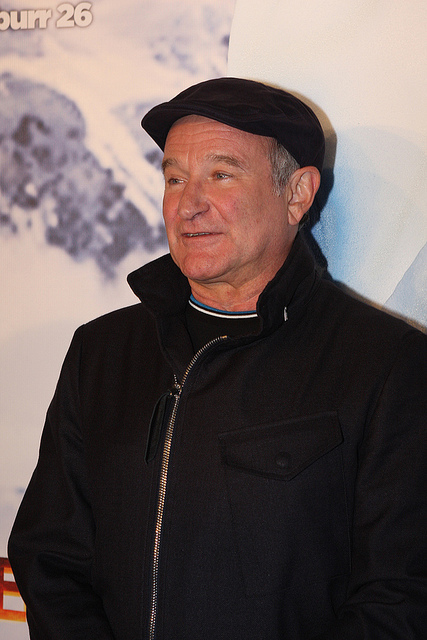
Williams at the Happy Feet Two premiere in 2011 | Photo by Eva Rinaldi Photography via Flickr (http://bit.ly/1sS5Ktz)
I’m not sure what year it was that I first saw Dead Poets Society. IMDB tells me it was released in 1989, so it must have been at least another six or seven years before I saw it, but the timeline doesn’t really matter. For a young and highly sentimental lover of language, that film gave me a place to belong. It had been preceded by Hook and Aladdin, and later I would see Good Morning Vietnam! and Good Will Hunting and recognize that it wasn’t an accident that all these films that told stories of the world’s strange beauty happened to display the talents of this one man.
He was the genie who made magic; the therapist who could tell you it wasn’t your fault; the dad-turned-nanny who loved his children so much he couldn’t stand to be away from them.
This is what makes Williams’s death by suicide at 63 such a shock: He brought magic into so many people’s lives; he seemed to believe and communicate so many things that were good about the world. It’s days like today when I wish for nothing more than a time machine; our proximity in time to when Williams was alive seems so close that it’s unfair that we can’t go back in time to tell him that he will be okay, that depression doesn’t last forever even when it seems to, that there are realities outside of his own mind’s darknesses.
But it never is that easy. It is also one of the most important things we as religious people need to understand, that depression is a real illness–not a battle to be won or lost, nor a mental condition to be overcome. It is just as real a disease as any, and God cares for and loves and is with all those who struggle with it, even now.
Williams was born in Chicago and raised in the Episcopal Church, which he described in a standup routine thusly: “I don’t understand the whole fundamentalist thing; you see, I’m an Episcopal; that’s Catholic Lite. Same religion, half the guilt!” He married three times and has three adult children; the thought of them being left fatherless now is devastating.
He was one of only two students admitted to an advanced program at Julliard his freshman year; the other was his good friend Christopher Reeve. Williams told PARADE in September 2013 that his two divorces had cost him a lot: “It’s ripping your heart out through your wallet.” He listed his Napa ranch for sale and lived primarily in the San Francisco area with his wife Susan Schneider, whom he married in 2011.
Williams was on the advisory council for Walden House, a recovery center in San Francisco, having himself gone through several bouts with drug use, alcoholism, and sobriety. Speaking to The Guardian about addiction in 2009, Williams said “There’s nothing romantic about it. This idea that as an artist you have to push yourself and explore the dark side? I went there. You can do a lot more interesting stuff when you’re not messed up.”
It’s hard to pick a favorite scene of his. Williams had a gift for making moments: Mrs. Doubtfire’s run-by fruiting. Adrien Cronauer’s decision to lock himself in the studio and report on the explosion at the restaurant. In real life, when he called Steven Spielberg during the filming of Schindler’s List to cheer him up. But I don’t know if there is any moment I have thought of more than this.
If you find yourself struggling with depression, know that you are not alone, and never hesitate to ask for help. This is the website for the National Suicide Prevention Lifeline, or you can call 800.273.TALK.




